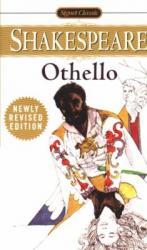
Shakespeare's Othello is about a Moorish general for the Venetian army, Othello, who falls in love with a Venetian lady, Desdemona. Unfortunately, Desdemona's father is very racist and sees Othello as vermin when he finds out they're in love. Being Shakespeare, this book is very tragic.
Though this play may have been well-written, I don't have much else good to say. The plot is extremely simplified, and the characters are infuriatingly stupid. This book is not a boring read, but it is also in no way interesting.
The characters are not very developed, relatable, or lovable. This dramatically stunts this play's ability to be tragic. Needless to say, I am not a huge fan of this book, but there were some good things about it.
Reviewer Grade: 11
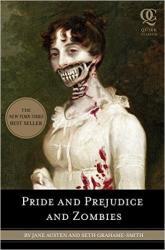
Back in the zombie heyday of 2009, the idea of combining one of the most feminine pieces of literature with the oft masculine-marketed gory violence seemed like an interesting idea. I, for one, didn’t particularly care to read Jane Austen’s Pride and Prejudice , but this take on the romantic classic certainly piqued my interest. Because of the addition of zombies to this plot, I was impelled to read this story to see how these drastically different archetypes were combined. I certainly wonder if the book would have been more enjoyable if I had read Pride and Prejudice beforehand, or if I would have remained far abreast of it altogether.
Partly due to the severe dichotomy of the original story and the zombie additions, there were certainly moments where I could tell what segments of Jane Austen’s plot were modified to fit the new, apocalyptic sensibilities.
The two concepts worked together somewhat, occasionally adding action to a scene that would have likely been boring in its predecessor, but in maintaining the story and outcomes of the original, the whole experiment didn’t quite “gel” as it could have. Perhaps the addition of the prequel and sequel to this book helps to round out these distinct edges, but I have yet to read those books yet.
When it comes right down to it, I struggled to get through this book. With the language and verbiage retaining is feel from the original, the archaic nature of the dialogue was not as easy to read as I would have hoped. In the end, I was practically just reading Pride and Prejudice, but occasionally “changing the channel” to a zombie film whenever anything became boring.
I applaud Seth Grahame-Smith for following through on this ambitious idea, but it almost seems like anyone could easily merge zombies to a romantic classic if they maintain the majority of the source material.
An intriguing idea that never quite fully “connects,” I give Pride and Prejudice and Zombies 3.0 stars out of 5.
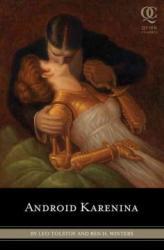
Despite struggling through both Pride and Prejudice and Zombies and Sense and Sensibility and Sea Monsters , I was pleased to find the most lengthy of these “monster classics,” Android Karenina, was a fast and engaging read.
If anything, it proves to me that I can’t grasp Jane Austen’s writing style nearly as smoothly as I can Leo Tolstoy’s. Part of the ease of reading Android Karenina probably came from knowing the original plot ahead of time a little better than I did for Pride and Prejudice and Sense and Sensibility . And yet, the real reason is more visceral than that.
What Android Karenina’s predecessors attempted was to take two vastly different genres and mash them together in the hope that the combination would interest readers. Where Android Karenina succeeds where the others have failed is that the addition of the steampunk/science fiction genre enhances the story. Adding zombies or sea monsters to a romantic story to liven up the boring sections merely accentuates where these boring parts are. When the robotic-themed changes to a piece of classic Russian literature directly enforce the overt themes of the rise of communism, then the story becomes much more compelling.
Granted, some of the source material can be easily implied past the steampunk coverings, but that’s always been the case with these “Quirk Classics.”
At the very least, the pacing of this story kept my interest throughout and rarely dragged itself down via the “drama” of aristocratic gossip and endless discussion of potential marriage partners. But again, this is likely the outcome of adapting Leo Tolstoy instead of Jane Austen. After reading this book, I certainly want to go back and read the original Anna Karenina , even despite the hefty page count.
An enhanced version of Tolstoy’s original in more ways than one, I give Android Karenina 4.0 stars out of 5.

A coworker of mine suggested this book to me a few months back. The title sounded interesting, so I put it on my Overdrive wish list and waited for it to become available. Both he and I have a somewhat thorough understanding of Japanese culture, so once I got into this book, I found myself imagining it as an anime. Of course, because The Wind-up Bird Chronicle was originally written in Japanese, there are plenty of cultural idiosyncrasies that might be hard to understand from a different cultural viewpoint. At times, the content is a bit weird, the sex awkward, and the violence strangely surgical.
What was quite refreshing with the narrative in The Wind-up Bird Chronicle, was its timelessness. Written in the early 1990’s and set in the mid-1980’s, only a few technological items (i.e. a land line, an early computer, etc.) haven’t held up well over time. Everything else about the story is so character-driven that it could probably happen at any time. These characters are odd, to say the least. From psychic sisters named after Mediterranean islands to a wealthy perfectionist mother and her mute son, many of their sub-plots do end up tying together in the not-so-surprising ending.
As a “chronicle,” the book does feel episodic at times, hence why I imagined it as an anime. Because I have seen a lot of anime, the content of this book didn’t surprise me. There’s some weird stuff out there, and Japan seems to create quite a bit of it. While the sex and violence might be off-putting to some, it’s not necessarily erotic or graphic in its presentation; it is merely a fact of life. A strange life, to say the least, but a life nonetheless. Parts “slice of life,” “harem,” and “psychological thriller,” in terms of genre, The Wind-up Bird Chronicle is an excellent book for anyone already accustomed to Japanese storytelling.
A prime example of an almost “standard” Japanese plot, I give The Wind-up Bird Chronicle 3.5 stars out of 5.
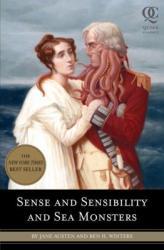
After struggling my way through Pride and Prejudice and Zombies, I thought perhaps the next entry in the “Quirk Classics” line of books would be better. After all, it had a new co-author (alongside Jane Austen) and replaced the almost cliché zombie trope with the lesser-seen sea monster framing. Unfortunately, I once again found myself struggling through the archaic language of Austen’s time. Not only that, but I felt there was far too much talking and way too much nonsense, and that wasn’t even about the sea monsters. I’m starting to suspect that I just plain don’t like Jane Austen’s writing.
Half of the book is practically filled with young women swooning over eligible bachelors, learning that these bachelors are engaged or married, and then becoming depressed because of this revelation. If they spent less time gossiping and more time communicating, perhaps they wouldn’t have these problems. Of course, I realize that this was probably an artifact of the era in which the original Sense and Sensibility was written, but it all seems pretty “senseless” if you ask me. Speaking of senseless, this book certainly delivers on a lot of it, when it comes to the violence of the sea monsters.
As was the case with Pride and Prejudice and Zombies, I feel Austen’s prose holds back the potential for a much more interesting story. Practically steampunk in its underwater cities and rudimentary diving systems, if this book was an original story, I think it would have been much more interesting to read instead of having to slog through another Jane Austen novel. Of course, most people probably wouldn’t have picked up such a novel, because they wouldn’t know what it’s about. Modifying a Jane Austen story merely gets readers in the door, but it seems like a lazy solution to gain sales instead of a way to create an engaging narrative.
Another attempt at fusing Jane Austen with unnecessary violence, I give Sense and Sensibility and Sea Monsters 3.0 stars out of 5.
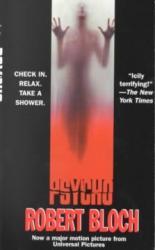
Once again, I find that the source material on which a famous movie is based is equally as good and equally as famous. What strikes me as interesting is that the quick turn on some of these literary masterpieces from page to screen has largely remained unchanged. Gone with the Wind only took three years before its film debut, The Martian took four years, and Psycho only took one. Clearly, these stories are practically screaming to be made into movies, and most have done quite well as the cultural icons of their age.
Of course, having already seen the film on which this book was based, I was well aware of the twist ending. Nevertheless, reading through this book was almost enhanced by this a priori knowledge as one would probably not have guessed the twist if they were reading it for the very first time. There are just little hints here and there that something is off, but it’s not until close to the end that we find out that everything is not as it initially seemed. Even the visuals provided in the film version helped to aid my imagination in establishing the setting and characters.
And yet, as there always is, there are some differences in the book that did not make it into the movie. I wonder if Norman Bates was made a lot slimmer in the film partly due to Hitchcock’s portly frame. In the book, his overweight body adds a layer to the character (both literally and metaphorically) which helps flesh out (Har har. OK, I’ll stop) more of the explanations as to why Bates ended up this way. Much like One Flew Over the Cuckoo’s Nest, being able to get into the mind of Norman Bates was a fascinating examination of someone with a severe mental illness.
A fantastic read equally on par with the Hitchcock classic, I give Psycho 5.0 stars out of 5.
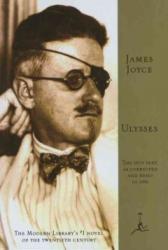
OK, I’ll be the first to admit that perhaps the audiobook version of this
story isn’t the best way to digest it. While I did appreciate the Irish
accent of the man who read this book, there really wasn’t much of a chance
to re-read sections that were quite confusing. As a result, I have no idea
what this book is about or what it was supposed to convey. I had a loose
understanding that it was based on Homer’s The Odyssey, which helped make a
few connections here and there, but I honestly can’t say that this parallel
between the plots of the two stories is obvious at all.
Perhaps the weakness I perceive in this story is due to its status as one of
the great pieces of modernist literature. If that’s the case, then I’ll
admit that I don’t understand modernist literature at all. None of it made
any sense at all. I would almost wager, at times, that Joyce was merely paid
by the word, thus explaining the numerous times he just listed off the names
of people, synonyms of words, or just rambled on until he made a couple extra
shillings. Of course, it could be that I expected a story to be present
instead of a loose string of poetic and complicated words. Maybe that’s the
link it shares with The Odyssey: both are epic poems (but for my money, I’d
read The Odyssey again in a heartbeat instead of this).
This is also not to mention the controversial topics that Joyce covers in
this book. From sex to religion and back to sex again, I wouldn’t say I
agree with his opinions on anything. For years I’ve heard that this is one
of the great stories of literature, but I can’t say I’m impressed. None
of it was particularly inspiring (the parts that made any sense, that is) and
if he had a point to make, it was lost on me. Again, I might get more out of
Ulysses if I was able to read it instead of listening to it, but as it stands
I don’t have any interest in reading this lengthy piece of nothingness
after having had to listen to it.
A disappointing and confusing piece of “literature”, I give Ulysses 1.0
stars out of 5
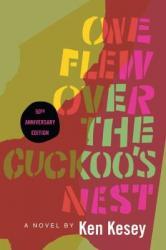
As one of the few films in American history to win the “big 5” Academy
Awards (which are Best Picture, Director, Actor, Actress, and Screenplay), I
was interested in the book that helped One Flew Over the Cuckoo’s Nest
attain its award-worthy status. I figured that if such a book could provide
such great content to win awards as a movie, it would certainly have artistic
merit in its own right. After all, many people posit that a book is better
than the movie it is made out of. I wanted to make sure that, at the very
least, it wasn’t any worse than the movie.
Perhaps the largest difference between the two versions of this story (I’m
not going to go into the live-theatre version, since I haven’t seen it), is
that the book has a very interesting narrator in the character of “Chief”
Bromden, whereas the film merely uses the camera to tell the story. Because
we get a glimpse into the mind of the deaf mute giant, he becomes not only a
subjective observer of the situation around him but also a vivid example of
what mental illness feels like. Instead of just focusing on the ways Randle
McMurphy bucks the stringent hospital system, we also get a sense of how
reality is filtered through a disabled mind.
As is usually the case with movie versions, I noticed a lot more content and
characters in the book version because it was likely these extraneous
elements were removed from the film for content and run-time issues. Still, I
wonder if the film would have had more of an impact on educating audiences
about mental illness if it included some of the Chief’s unique
observations. Either way, both the film and the book are excellent pieces of
art, even if it may be a little difficult to swallow at times that these
mental hospital practices have only recently been changed for the better.
An excellent book that spawned an excellent movie, I give One Flew Over the
Cuckoo’s Nest 4.5 stars out of 5.
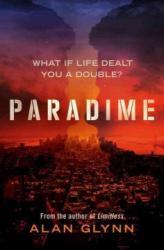
The first time I was introduced to Alan Glynn’s writing was through the
film, Limitless (2011), which itself was based off his first novel, The Dark
Fields. While I enjoyed the film for its visuals, what really struck me as
interesting was the storytelling and characters Glynn created. Now fifteen
years after his first standalone novel, Paradime continues to show Glynn’s
talent in creating engaging plots and characters. Since I really enjoyed this
book, I will do my best to review it without spoiling it for anyone.
At its most simple level, Paradime is a modernized retelling of Mark
Twain’s The Prince and the Pauper, or at least half of it anyway. Told from
the perspective of an out-of-work and out-of-luck cook, Danny Lynch, the
pacing of each of the three acts is steady and intense. Even if some of
Danny’s vocabulary seems a little advanced at times, he is the perfect
“everyman” to convey his peculiar circumstances to the reader. Those
familiar with Limitless will probably see many parallels between the two
stories, with the main exception being how the story ends for Danny.
Glynn’s writing style is very natural and easy to read in this modern
thriller. Each chapter left me wanting to read more and I found myself having
difficulty stopping because the pull of the plot was so intense. I also
appreciated the ability of Glynn to tie things up in an almost unexpectedly
expected way so that no detail in this book was left unused. While this may
have been the first time I’ve read anything by Alan Glynn, I am now
certainly a fan and will have to go back and pick up his other books to read.
A fast-paced and thrilling read, I give Paradime 5.0 stars out of 5.
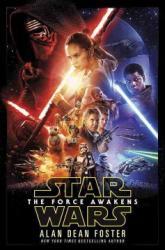
If you’ve been following along recently, you’ll know that I’ve been on
a bit of a “movie” kick when it comes to the audiobooks I’ve listened
to. While there are plenty of movies based on books, I haven’t really been
one to read novelizations of movies. That being said, I’ve found the
writing style in my own novels to be a bit of a novelization of the ideas in
my mind, since I usually try and describe scenes in a cinematic way. At any
rate, I was expecting a story that held close to the film, and this book
certainly delivered on that promise.
I’ll admit that the more I think about the plot and characters of The Force
Awakens, the more I find that it almost exactly matches the events of A New
Hope. However, there were some weaknesses in the first installment of the
Star Wars franchise that I feel are addressed in this recent installment.
Sure, all the elements are there, but they’ve been mixed around into
different characters, settings, and conflicts that add a bit more depth to
the story than the archetypical one presented in A New Hope. As a reboot, The
Force Awakens does an excellent job of calling back to what made the original
great, but doing so in a way that is still different enough to provide
interesting twists and questions.
One thing I do like about this version of the story, compared to the movie,
is the “deleted scenes” that help explain some of the plot holes from the
film. Maybe these scenes hindered the flow of the movie (or weren’t
important enough to include) but they certainly helped me understand the
story a lot better now that I know about them. Finally, while I know that
many films have “enhanced audio” for blind people, I’d almost recommend
these people listen to this audiobook instead. The music, sound effects, and
even many of the actors’ voices all are used at a pace that’s much slower
in order to really grasp what’s happening with the story.
A fantastic audiobook that faithfully captures everything (and more) that
made the film great, I give Star Wars: The Force Awakens 4.5 stars out of 5.
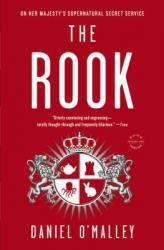
One of the nice things about listening to audiobooks from my library (via the
Overdrive app), is that I can pick up a book and listen to it without really
knowing what it’s about other than a title and a cover. In this way, I
often have no preconceived notions about the book other than first
impressions. At this point, all I’m giving up to “read” the book is the
time it takes me to listen to it, and I have plenty of that driving to and
from work every day.
Since I had no idea what this book was really about, I was surprised at how
humorous it was. If I were to combine a few, better-known series together,
I’d say this is X-Men mixed with James Bond, with just a dash of Jason
Bourne all blended together in Monty Python’s Flying Circus. An odd
combination, I know. But somehow, it works here. The humor is markedly
British, but the characters and their powers are supernatural, to say the
least. Since this was merely the first in a developing series, I can’t wait
to get to book #2: Stiletto.
All this being said, there were a few structural choices to this book that I
often found confusing, which may just be part of listening to it in audiobook
form instead of reading it. First off, the decision to have the main
character afflicted with amnesia was an interesting way to essentially give
the audience what the character already would have known but had conveniently
forgotten. Secondly, because the letters from her former self were used as
backstory, these “flashbacks” were often confusing because it was easy to
lose track of which Mfwany Thomas (glad I had the audiobook for the
pronunciation of this name) was “speaking” at the moment.
An interesting premise with plenty of potential in future iterations, I give
The Rook 4.0 stars out of 5.
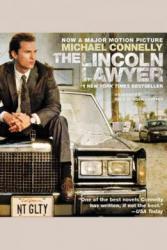
While I saw the movie before listening to the audiobook, I must say that I
still really enjoy the main character. He’s one of those guys you love to
hate, but he’s trying so hard to do the right thing, even if it means
defending a scumbag who deserves a lot worse. Of course, since I had seen the
movie already, I had an idea how it was going to end, but couldn’t remember
the specifics. Perhaps that’s a measure of a great crime drama: all the
misdirection makes it difficult to know “whodunit”, allowing future
rereads to be enjoyable.
But, back to the main character, Mickey Haller, I think one of the reasons
this book was a breeze to listen to was because the main character’s POV is
so well written. You can tell that he has some baggage from his father, which
is partly why he defends everyone, regardless if they’re guilty or not. The
fact that Haller knows his way around the legal system and uses it to his
advantage to even get the guilty an innocent ruling just shows that he takes
pride in his work, even if it labels him as someone who keeps the crime on
the streets.
The plus to this audiobook was also the narrator, who was awesome in bringing
all the different characters to life with his voice acting. Even if the story
is told from the point of view of the eponymous “Lincoln Lawyer,” there
are plenty of interesting people in this book, and each one certainly has a
different “sound” to them. It’s the attention to these details that
differentiates a narrator just reading a book to you and a voice actor who
can bring the events happening in the words he’s speaking to life.
A great start to an interesting crime drama series, I give The Lincoln Lawyer
4.0 stars out of 5.
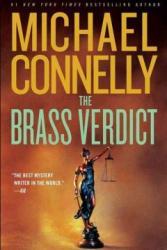
Another book, another trial for the Lincoln Lawyer. While I appreciated the
stand-alone nature of this book, I also liked that knowledge of the events in
the first book of this sub-series helped to provide context for the
challenges Mickey Haller now faces. The main case of this novel was pretty
predictable, especially if you read into the insinuation of the title. I
would have liked a little more attention on the side-case surrounding the
death of Haller’s lawyer colleague. It seemed to be more of a Harry Bosch
story, though, so I can understand why the focus was on Haller’s case.
Once again, Michael Connelly creates an easily readable series of events that
unfold in the courtroom. Some twists at the end were exciting developments
but were definitely easily guessed if the reader was paying attention.
There’s almost a guilty pleasure in following Haller along as he embeds
that reasonable doubt into the jury’s minds. Something about the justice
system being used to make absolutely sure someone is innocent or guilty just
sits right, even if it’s in the defense of a completely unlikeable
character. This character’s final fate was equally as satisfying, even if
it wasn’t in court.
As noted above, my only qualm with the novel was that it seemed to be only
one side of the story. While we followed Mickey Haller, there was another
story unfolding with Harry Bosch that probably could have filled up another
volume. There was a lot that Bosch did behind the scenes that made his story
also seem quite interesting, even if it wasn’t expressed in these pages.
The connection between these two characters at the end of the book was also
nice, and I am curious how often Bosch will come back into play in future
Mickey Haller books.
A straightforward courtroom drama with predictable twists, I give The Brass
Verdict 3.5 stars out of 5.
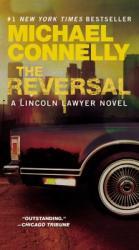
After two novels of Mickey Haller defending guilty scumbags, Michael Connelly
changes it up with The Reversal. Not only does the title refer to the
reversal of a 24-year old conviction, but also to the main character’s swap
over to the prosecution. While there seems to have been a book between this
one and The Brass Verdict, I have a feeling it was mostly about Harry Bosch,
since the hinted details in this book give me a good idea of what happened
and it didn’t change the last reference point of Mickey Haller.
Now that these two main characters were tied together in this case, one of
the issues I had with this book was how often it switched between first and
third person POVs. Perhaps I was too used to the story being told from Mickey
Haller’s perspective and there was so much that happened outside of his
direct involvement that it was necessary. However, there were times where
Haller was present in the scene and it seemed to switch between the two POVs
somewhat inconsistently, adding to my confusion as to who was speaking. I
only hope the next book in the series focuses more on Haller than splitting
the time between him and Bosch.
Furthermore, while I did appreciate the change of Haller being a part of the
prosecution team with his ex-wife, the story unfolded much in the same way
the others had. Most of the trial was pretty predictable with the twists
being easily recognized well before they were revealed. The unpredictable
ending is almost part of the template now, so even though it was an exciting
development, I had come to expect it.
Another Michael Connelly standard with a few changes to make it interesting,
I give The Reversal 3.5 stars out of 5.
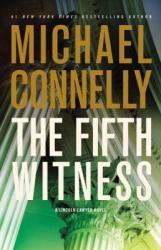
In the fourth installment of The Lincoln Lawyer series, The Fifth Witness
follows Mickey Haller as he navigates another murder trial. This time, the
real scenario of the foreclosure crisis is brought in to help set the stage
for the trial. Using a historical event like this helped to bring the story
together in a way that felt more real and relatable than the previous entries
in the series. Most Americans I know who were affected by the housing market
crash would certainly be entertained by this story of corruption and
underhanded dealings, if for no other reason than to justify how screwed up
the system is.
Gone from this part of the series is detective Harry Bosch, who I felt
distracted from the main storyline centering around Mickey Haller and his
court battle in the previous two books of this series. This time, it’s all
Mickey. What helped to make this book stand out from the rest was the amount
of soul-searching and character development our favorite defense lawyer does
throughout the events unfolding around this trial. Because of his work as a
defense attorney, it was easy for him to become cynical, thus making his
aloof attitude more entertaining than endearing. This time around, he starts
to become self-aware and sees that his life isn’t heading in the direction
he wants.
I appreciated the slight bit of meta-humor in this book, not only in its
title but considering it came out around the same time as The Lincoln Lawyer
(2011) movie. And while some of the numerous “sudden evidence” events for
the trial was a bit of a cheap way to add twists to the story, Connelly
expertly hid the true twist ending until the final moments of the book,
something that was somewhat missing from earlier parts of the series. With an
interesting nod toward some future storylines, I felt The Fifth Witness is
the strongest entry in the series so far.
A great courtroom drama pulled straight from the housing crisis, I give The
Fifth Witness 4.0 stars out of 5.
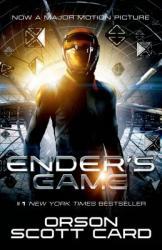
In another “lapse” of my reading habits, I didn’t manage to read
Ender’s Game until the movie of the same name came out in 2013. At the
time, all the sci-fi fans were eagerly anticipating a film that had taken
over 25 years to finally become a reality. While I thought the movie was
quite well done and engaging, after I read the book, I can understand why
some of the diehard fans of the series were disappointed. As is usually the
case with book-to-movie transitions, sub-plots often find themselves on the
cutting room floor. Of course, I don’t blame them for cutting what they
did; after all, it is called Ender’s Game.
Even though watching the movie first spoiled the exciting twist of the ending
when I read the book, I almost read the book differently knowing how it would
turn out. I could see the signs leading up to the shocking reveal, almost as
if I had read it before. I did appreciate the sub-plot with Ender’s
siblings and their efforts back on Earth as their brother was winning the war
in space. If anything, it helped to break up the intense action surrounding
the eponymous main character so that the reader could fully absorb what was
happening in the universe on a political level as well as a military one.
It is disappointing that there will likely be no more movies in this series
since the source material is full of interesting ideas that I’d like to see
on the big screen. Perhaps the series would be better suited for a television
show (a la Game of Thrones) to fully include all the different elements that
made it a classic of sci-fi back in 1985. Either way, I look forward to
exploring more of Orson Scott Card’s universe in the next book of the
series: Speaker for the Dead.
A fantastic sci-fi story with an incredible twist ending, I give Ender’s
Game 5.0 stars out of 5.

What a world we live in! It’s exciting to see a self-published book receive
such attention, eventually becoming a New York Times bestseller! Truly, if a
writer is talented enough with a good enough story, they can make it in this
over-saturated market. And while some of my love for this book comes from my
hopes of eventually being “discovered” as a self-published author, most
of it comes from my love of scientific realism in fiction. Truly, this is
more of a challenge than world-building in a fantasy genre, because in order
for it to be believable, it must obey the laws of physics.
But let’s get down to brass tacks here. There is no doubt that Andy Weir
did his homework on this book. In fact, some sections almost read like the
output section of a very complicated spreadsheet (which I certainly
appreciate, on a personal level). Even with the technical detail to keep the
story grounded in science, the successive cause-and-effect events that
eventually lead to the climax of the story give the reader equal amounts of
elation and heartbreak right along with the protagonist, Mark Watney. Still,
the problem solving accomplished in this novel merely proves how smart we are
as a species today, and how the vast knowledge of the universe has catapulted
us into the very realistic scenario portrayed in the pages. In fact, Weir’s
methodical approach really gives the reader a scale of how big an operation a
trip to (or from) Mars would be.
Even though the science is front and center, the whole reason we read these
almost intimate logs of a Martian astronaut is because the characters are so
well written. With a humor and spunky attitude that help alleviate his dire
situation, Watney almost comes across as a genius “everyman” in that most
of his solutions could be arrived at with a little bit of thought and
ingenuity. And while the majority of the book centers around Watney’s logs,
every minor character has a depth and expertise that helps to propel the
story forward.
A fast and fun read full of excitement and ingenious science solutions, I
give The Martian 5.0 stars out of 5.
For more reviews of books and movies like this, please visit
www.benjamin-m-weilert.com
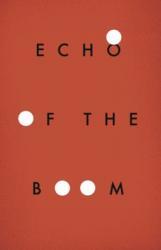
From the title of this book, I would have expected it to be about the
aftermath of an apocalypse-inducing event. If anything Echo of the Boom is a
misnomer and the book should be titled Prelude of the Boom. The cover also
doesn’t give much into what it’s about, other than the four different
points of view which are followed throughout the narrative.
While I did eventually like the book, it took too long to get there (some of
the occasional typos didn’t help me get into it either). With the
characters’ motivations unclear from the start, it becomes obvious about
150 pages in that nothing is really going to happen in this book. Instead of
having any driving force propelling the characters forward, it’s more
accurate to describe this book as a nearly 500 page rap battle. Each
character has their own track, living their lives the way many teenagers
today might (which in itself is a scary thought), but occasionally the tracks
mix together albeit briefly and with little perturbation to the individual
characters. At least the words the author uses are artistic and articulate,
making it fun to read.
Honestly, the very last sentences of this book made me want to read what
happens next much more than what had already been written, since it sounded
like it was going to be much more interesting than the origin stories of
these characters. If the author’s opinions and worldviews weren’t so
blatantly obvious through this book, it might have been interesting as a
“slice of life” novel, but at least he has something to say (even if
it’s regularly redundant). If anything, this book should give parents the
motivation to be more actively involved in their teenagers’ lives, lest
they end up with the motivation to destroy all systems of authority if for no
other reason than pure anarchy.
A rewarding read that takes some getting used to; I give Echo of the Boom 4.0
stars out of 5.
For more reviews of books and movies like this, please visit
www.benjamin-m-weilert.com
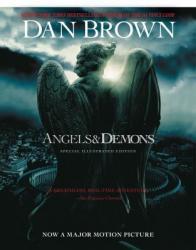
While Angels and Demons is not nearly as popular as its sequel, the famous (if not infamous) The Da Vinci Code, the elements which led to its successor’s success are certainly all contained within this first book in the Robert Langdon series. Of course, just because you have the materials to build a nice house doesn’t mean that it magically becomes a mansion. Despite containing many of the elements that made The Da Vinci Code so good, Angels and Demons feels a little underdeveloped in quite a few areas.
First, the protagonist, Robert Langdon, is supposed to feel like an “Indiana Jones”-type character, but with a specialty like symbology as his background, I just can’t buy the action-hero transformation of this everyday academic. Add to this the almost repetitive nature of his “discoveries” wherein he makes an assessment, then goes to the location of the assessment only to find that he didn’t think of it in the right way and thus requiring the whole plot to shift gears as he rushes to the new location. He eventually had better predictions, but by then it felt repetitive.
Secondly, the whole “treasure hunt” to find the antimatter (of which I feel CERN is a more recognizable name than it was back in 2000) seemed to take a back burner to the parallel plot of the pope’s death and finding his replacement. It is hard to focus on both plotlines, especially since both of them had pretty predictable endings. Finally, the romance aspect of this novel seemed quite forced, even to the point where the final scene of the book felt like it was ripped out of a James Bond story. Wherein a modicum of charm from the male protagonist makes his female counterpart swoon with undying affection that wasn’t in any part of the prior plot.
A rough start to the Robert Langdon series, I give Angels and Demons 2.5 stars out of 5.
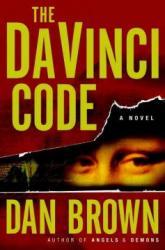
What a difference three years makes! Even though it contains all the same tropes and motifs that Angels and Demons did, The Da Vinci Code eliminates the fluff and focuses on the strengths of these individual pieces to create an enthralling adventure through Christian history. I will admit that I first read this book because I was curious about the controversy that surrounded it. While Dan Brown is a fantastic storyteller, and many of his connections and links to Christianity made sense, I still maintain that, at its core, The Da Vinci Code is just well-written fiction.
This time around, Robert Langdon is much better suited for the task of finding the “Holy Grail” instead of being a glorified Roman tour guide. His expertise in symbology certainly helped to drive the plot forward, even if it sometimes was in a misleading direction for the sake of a twist. I did appreciate how, even if a clue didn't immediately come into play, it became useful later to help round out the plot. It wasn’t just a series of “find me a rock” exercises but had a parallel set of intersecting strings and subplots that drove the story forward to its exciting conclusion.
And while the female protagonist was much more developed than the one in Angels and Demons, the villains also had more depth to them as well. Instead of a few individuals using the name of a huge organization like the Illuminati to create the conflict, a singular man with a singular goal helped to create the “chase” that propelled Robert Langdon across Christendom to find the Holy Grail. While both The Da Vinci Code and Angels and Demons share almost identical plot structures, the former shows that the execution of such a story is precisely what makes one a great read and the other an exercise in eye-rolling.
An exciting treasure hunt filled with fictional historical connections, I give The Da Vinci Code 4.0 stars out of 5.


